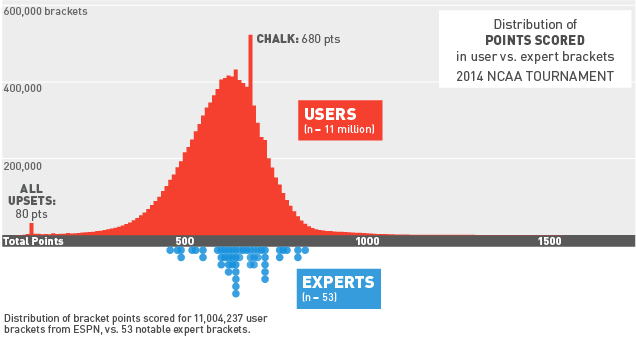The favourite never wins?
From Deadspin, an analysis of accuracy in 11 million tournament predictions (‘brackets’) for the US college basketball competition, and 53 predictions by experts
Stephen Pettigrew’s analysis shows the experts average more points than the general public (651681 vs 604.4). What he doesn’t point out explicitly is that picking the favourites, which corresponds to the big spike at 680 points, does rather better than the average expert.
Thomas Lumley (@tslumley) is Professor of Biostatistics at the University of Auckland. His research interests include semiparametric models, survey sampling, statistical computing, foundations of statistics, and whatever methodological problems his medical collaborators come up with. He also blogs at Biased and Inefficient See all posts by Thomas Lumley »

It is as you would expect. You mention favourites. Anyone can pick a relatively high degree of winners by blindly selecting favourites in any sport as is implicit in your post. The point is not to pick winners, the point is to “beat the book”.
If 99% of winners are favourites at odds of 1/100 and the experts (or the public or whomever) pick the 1% at 100/1 then who is doing “better”?
.
11 years ago
Only, in this example, the point actually is to pick winners, not to beat the book.
11 years ago
but you explicitly compared it to picking the favourites. The “expert” here is the book. Picking the favourites as pure winners will always do better than any expert in the long run in any sport. If it didnt bookmakers wouldn’t exist.
11 years ago
It’s not the ‘book’. It’s the tournament seeding.
11 years ago
I thought the point of your original post was to discuss how “the book”(ie favourites), “experts” and the general public did in making selections.
The bracket is analogous to making many individual predictions.
In any sporting event, the order one would expect, would be:
1. The book
2. Experts (as a group)
3. The general public.
11 years ago